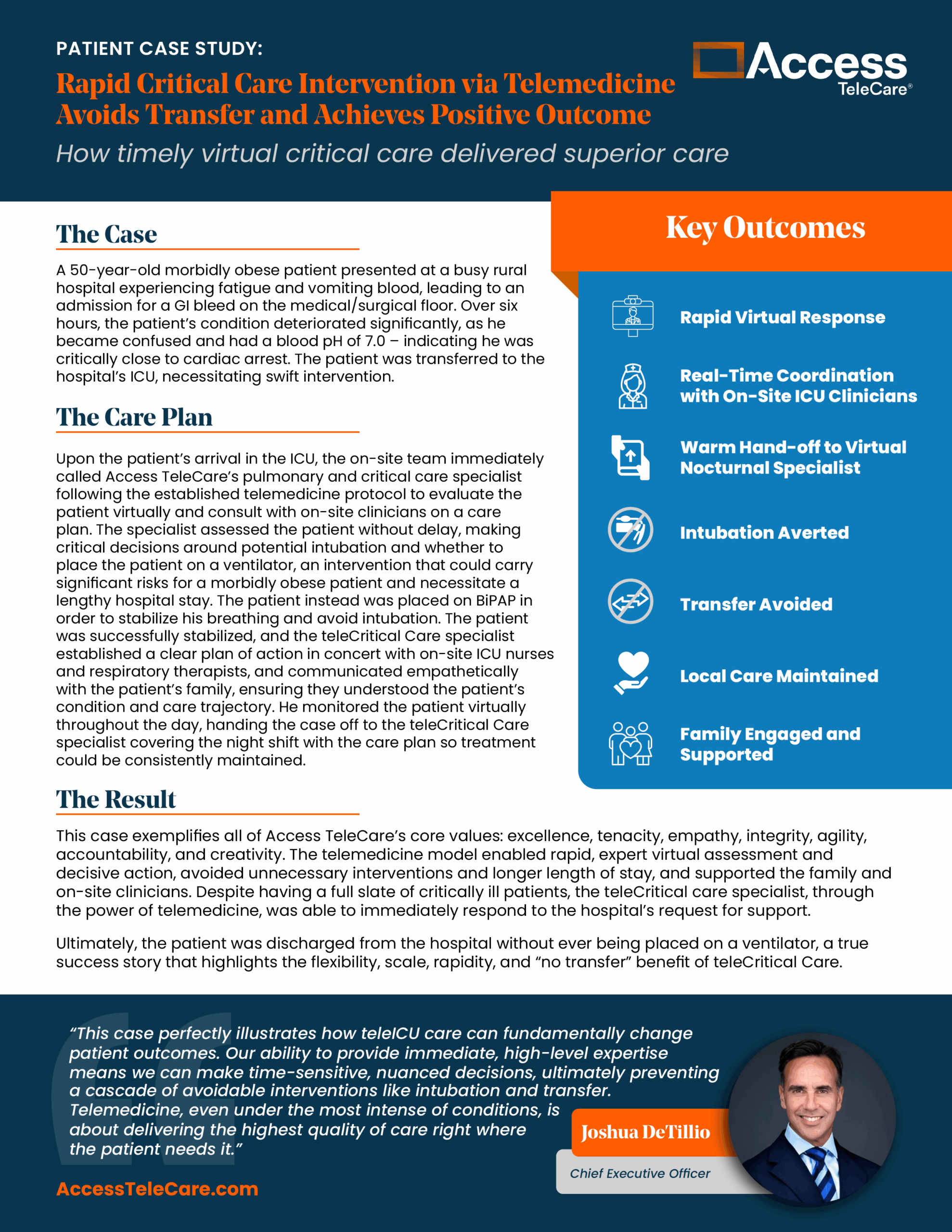Hospital Telemedicine Solutions
The Case
A 50-year-old morbidly obese patient presented at a busy rural hospital experiencing fatigue and vomiting blood, leading to an admission for a GI bleed on the medical/surgical floor. Over six hours, the patient’s condition deteriorated significantly, as he became confused and had a blood pH of 7.0 – indicating he was critically close to cardiac arrest. The patient was transferred to the hospital’s ICU, necessitating swift intervention.
The Care Plan
Upon the patient’s arrival in the ICU, the on-site team immediately called Access TeleCare’s pulmonary and critical care specialist following the established telemedicine protocol to evaluate the patient virtually and consult with on-site clinicians on a care plan. The specialist assessed the patient without delay, making critical decisions around potential intubation and whether to place the patient on a ventilator, an intervention that could carry significant risks for a morbidly obese patient and necessitate a lengthy hospital stay. The patient instead was placed on BiPAP in order to stabilize his breathing and avoid intubation. The patient was successfully stabilized, and the teleCritical Care specialist established a clear plan of action in concert with on-site ICU nurses and respiratory therapists, and communicated empathetically with the patient’s family, ensuring they understood the patient’s condition and care trajectory. He monitored the patient virtually throughout the day, handing the case off to the teleCritical Care specialist covering the night shift with the care plan so treatment could be consistently maintained.
Access TeleCare’s teleICU model combines proactive rounding with on-demand intensivist consults to support intensive care and support bedside teams.
Access TeleCare’s virtual ICU program also includes full team integration — nursing, pharmacy, respiratory therapy, and more — creating a collaborative environment where on-site staff learned directly from experienced intensivists.
Learn more about our programs and how comprehensive telemedicine programs can transform specialty care for your hospital.
The Result
This case exemplifies all of Access TeleCare’s core values: excellence, tenacity, empathy, integrity, agility, accountability, and creativity. The telemedicine model enabled rapid, expert virtual assessment and decisive action, avoided unnecessary interventions and longer length of stay, and supported the family and on-site clinicians. Despite having a full slate of critically ill patients, the teleCritical care specialist, through the power of telemedicine, was able to immediately respond to the hospital’s request for support.
Ultimately, the patient was discharged from the hospital without ever being placed on a ventilator, a true success story that highlights the flexibility, scale, rapidity, and “no transfer” benefit of teleCritical Care. Nursing skills and confidence with high-acuity care also improved. A distinguishing feature of Access TeleCare’s virtual ICU model is providing ongoing coaching and clinical education for on-site clinicians. Eighteen months in, the CNO reported significant gains in both capability and confidence among the care team.
“This case perfectly illustrates how teleICU care can fundamentally change patient outcomes. Our ability to provide immediate, high-level expertise means we can make time-sensitive, nuanced decisions, ultimately preventing a cascade of avoidable interventions like intubation and transfer. Telemedicine, even under the most intense of conditions, is about delivering the highest quality of care right where the patient needs it.” – Joshua DeTillio, CEO, Access TeleCare









